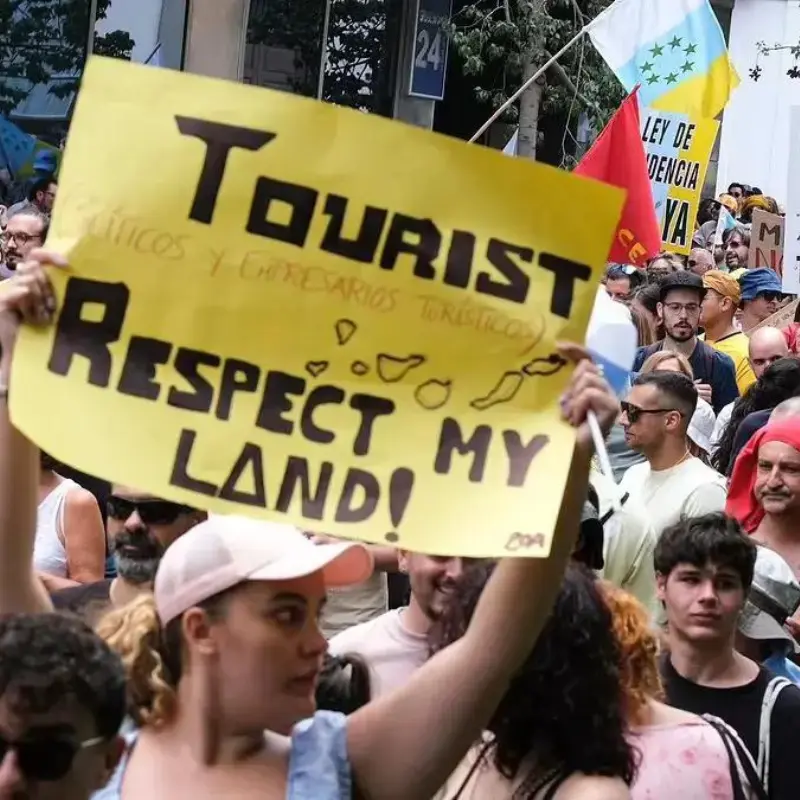Tourist hotspots like Ibiza and Mallorca are pushing back and locals rising up against bad tourists. This change marks a shift in expectations for travelers worldwide. As the summer season approaches, similar sentiments are spreading across Europe.
In cities like Barcelona, Athens, and Málaga, locals are increasingly vocal about the need for tourists to respect their culture and environment.
These demands highlight a growing global trend –– destinations are no longer willing to tolerate disruptive behavior that damages local communities and ecosystems. Instead, they are advocating for responsible tourism that benefits everyone involved.
Growing Protests And Local Sentiments
In the Canary Islands, residents have made their message clear through banners saying, “Tourist: respect my land!” Similar protests are spreading across Europe’s tourist-heavy cities.
In Barcelona, local authorities have taken the unusual step of removing a bus route from Google Maps to prevent tourists from overcrowding public transport and displacing elderly locals.
This action highlights a broader frustration among residents who feel their needs are being overlooked in favor of tourist convenience.
In addition to protests, cities are implementing new rules to curb bad behavior. The Balearic Islands, known for nightlife destinations such as Ibiza and Magaluf, have introduced alcohol restrictions to regain control over disorderly streets.
Economic Impact And Policy Changes

Tourism is booming post-pandemic, with record numbers of visitors. The World Travel and Tourism Council predicts a record-breaking year for tourism in 2024. In Spain alone, 85.1 million international visitors were welcomed last year, a 19% increase from the previous year.
While this surge benefits the tourism industry, it does not always translate into local benefits. Sebastian Zenker, an expert in overtourism, emphasizes the need to ensure that local communities benefit from tourism revenues.
He points out that in the Canary Islands, despite high tourism income, a significant portion of residents live near poverty.
Experts agree that attracting the right kind of tourists is crucial. Carina Ren, a tourism researcher at Aalborg University, explains that poorly behaved tourists have always existed, but now their numbers are overwhelming.
“Tourists aren’t behaving worse – there are just more of them,” she says. To manage this influx, cities like Venice have started charging day-trippers a fee to control visitor numbers, and Bali has introduced a tourism levy following disrespectful behavior by tourists at sacred sites.
Future Outlook And Management Strategies
Destinations worldwide are adopting strategic marketing to attract desirable tourists. Campaigns like Pure New Zealand focus on high-quality visitors who respect the environment, while Visit Iceland targets adventurous travelers.
These efforts reflect a broader shift towards sustainable tourism that prioritizes local benefits and environmental preservation.
Antje Martins, a PhD candidate at the University of Queensland Business School, argues that effective tourism management is key.
“When locals are blaming tourists for bad behavior, it’s not about the tourists,” she says. “It’s a sign that the tourism management has failed.”
Martins warns against exclusionary practices that favor wealthier tourists, which can be counterproductive and elitist. Instead, she advocates for policies that ensure all visitors can enjoy meaningful experiences without harming the destination.
Regulatory measures are also becoming more common. For example, Bhutan’s $100 daily tourist tax effectively limits visitor numbers and encourages longer stays, though it also risks excluding budget travelers.
Amsterdam’s recent campaigns aim to discourage young British men and stag parties, promoting a more respectful tourism culture.
As destinations navigate these challenges, the focus is on creating a balanced coexistence between locals and visitors.
Sustainable tourism practices that respect both the destination and its inhabitants are essential for the industry’s future health.











4 thoughts on “Angry Locals Rising Up Against Bad Tourists Says Respect Our Land”
It’s a tough spot, isn’t it? On one hand, tourism brings much-needed revenue. But I get why locals in spots like the Canary Islands are fed up. Respect goes a long way. Maybe it’s about finding a balance? Interesting piece, Julia.
From a local’s perspective, it’s not just about money. It’s our home. So yeah, respect is the minimum.
Balance is key, yeah. But what does that look like? Caps on visitor numbers? Higher taxes for tourists? It’s complicated.